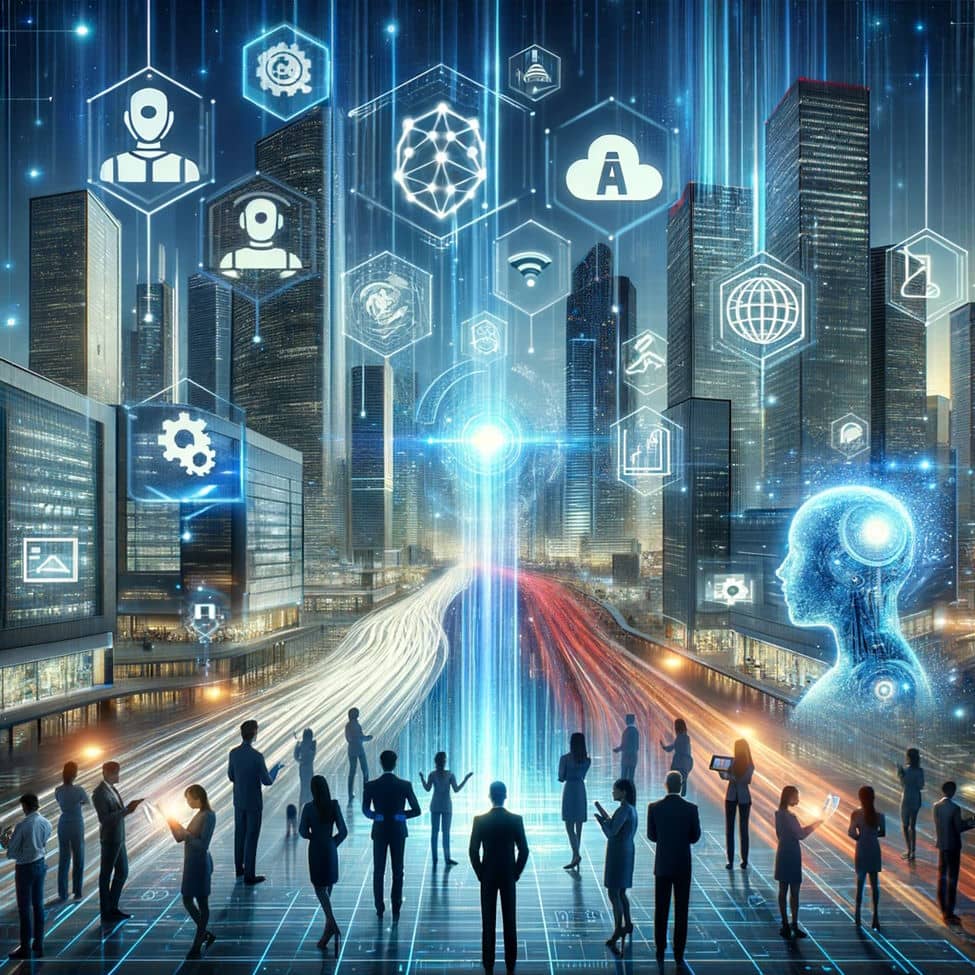In an era where technological evolution is the norm, Artificial Intelligence (AI) stands out as a beacon of transformative power, particularly within the IT industry. This article delves into the multifaceted ways in which AI is reshaping the landscape of Information Technology.
From automating mundane tasks to revolutionizing data analysis and decision-making processes, AI's influence is profound and far-reaching.
As we explore the recent changes, impacts, and potential future scenarios, we'll also address the pivotal question: should companies embrace AI, or fear its potential to replace human roles? Through a balanced lens, we aim to uncover the nuanced dynamics of AI's integration into the IT sector, highlighting both the opportunities and challenges it presents.
Recent AI Changes in the IT Industry
The IT industry has recently witnessed a seismic shift thanks to AI. Enhanced automation capabilities mean that tasks once requiring human intervention can now be executed swiftly and with greater accuracy by AI systems. This revolution extends into e-commerce development, where AI tools streamline operations and personalize customer experiences like never before.
Machine learning algorithms are at the forefront, optimizing operations ranging from network security to customer service through predictive analysis and natural language processing. These advancements not only improve efficiency but also pave the way for more innovative approaches to problem-solving and service delivery.
AI's role in big data analytics has transformed data management strategies, enabling the extraction of valuable insights from vast datasets with unprecedented speed and precision.
The Impact of AI on Information Technology
AI's impact on Information Technology is profound, touching every facet from infrastructure management to software development. It enables more robust security protocols through intelligent threat detection systems that adapt and evolve.
In software development, AI-driven tools assist in code generation and testing, significantly reducing errors and development time. Moreover, Artificial Intelligence, AI voice assistants, and AI-driven chatbots enhance IT operations through predictive maintenance, foreseeing potential system failures before they occur.
This predictive capability ensures higher uptime and reliability of IT services, crucial for businesses in today's digital age.
Should Companies Implement AI?
The decision to implement AI is not without its considerations, yet the benefits it offers make a compelling case. AI can drive efficiency, reduce costs, and enable companies to offer more personalized customer experiences.
However, businesses must weigh these advantages against the initial investment in technology and training. Implementing AI also requires thoughtful integration into existing workflows and a cultural shift toward acceptance of AI-driven processes.
For companies willing to navigate these challenges, AI offers a competitive edge that is increasingly becoming a necessity rather than an option.
Will AI Replace IT?
The concern that AI might replace IT jobs is understandable yet largely unfounded. While AI will automate certain tasks, it primarily serves to augment human capabilities rather than replace them.
The future of IT will likely see humans and AI working in tandem, with AI handling routine tasks and data analysis, freeing up IT professionals to focus on more complex and creative problem-solving.
This synergy can enhance job satisfaction and open up new career opportunities within the IT sector, focused on AI system design, implementation, and oversight.
Benefits of AI in the IT Industry
The benefits of AI in the IT industry are vast and varied. Efficiency and productivity gains are the most immediate, with AI automating routine tasks and enabling faster decision-making. AI's predictive analytics can forecast trends and behaviors, allowing top IT Companies to be more proactive and strategic.
Furthermore, AI contributes to enhanced security, using sophisticated algorithms to detect and prevent cyber threats more effectively than traditional methods.
Customer service also benefits from AI, with chatbots and virtual assistants providing 24/7 support and personalized experiences. These advantages position businesses to be more agile, innovative, and competitive.
Will AI Create Jobs?
Contrary to the fear that AI will lead to widespread job losses, it is poised to create jobs, particularly in the IT sector. As companies integrate AI into their operations, there will be a growing demand for AI specialists, data scientists, machine learning engineers, and professionals skilled in AI maintenance and ethics.
These roles require a new set of skills, emphasizing the need for education and training programs to prepare the workforce for the AI-driven future.
Moreover, AI will enable entrepreneurs and existing businesses to develop new services and products, further expanding job opportunities.
Final Takeaway
Integrating AI into the IT industry heralds a new era of innovation, efficiency, and opportunity. While challenges exist, particularly in implementation and workforce adaptation, the potential benefits far outweigh the hurdles.
AI is not a harbinger of job displacement but a catalyst for evolution, creating new roles and enhancing existing ones. Companies that embrace AI can look forward to a future where technology and human ingenuity converge to solve complex problems and deliver unparalleled services.
As we stand on the brink of this AI-driven revolution, the IT industry is poised not just to adapt but to thrive, shaping a future where technology enhances every aspect of our professional lives.








